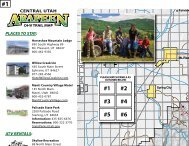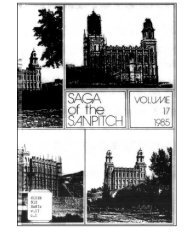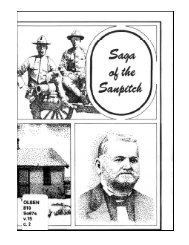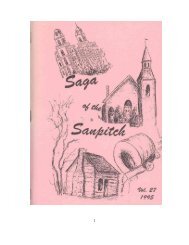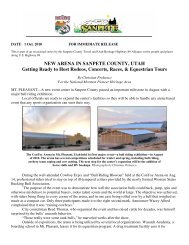Saga of the Sanpitch Volume 13, 1981 - Sanpete County
Saga of the Sanpitch Volume 13, 1981 - Sanpete County
Saga of the Sanpitch Volume 13, 1981 - Sanpete County
- TAGS
- saga
- sanpitch
- volume
- sanpete
- sanpete.com
Create successful ePaper yourself
Turn your PDF publications into a flip-book with our unique Google optimized e-Paper software.
Without oxen to be fed, or stray, <strong>the</strong>y could start earlier, and travel faster than with a heavily loaded<br />
wagon train. Word was sent abroad, "Let <strong>the</strong>m come, on foot, with handcarts." The converts received <strong>the</strong><br />
word with joy. They could travel from <strong>the</strong>ir embarkation point, Liverpool, England, to Salt Lake City, for<br />
$45.00.<br />
Most were poor; <strong>the</strong>ir only real treasure was <strong>the</strong>ir indomitable faith and courage. They rejoiced in<br />
anticipation <strong>of</strong> pushing or pulling a handcart to Zion. They realized <strong>the</strong> journey across <strong>the</strong> ocean and plains<br />
would call for physical strength and fortitude.<br />
Five long weeks were spent on <strong>the</strong> Atlantic Ocean. Each voyager was given detailed advice, with prayer<br />
to be <strong>the</strong>ir watch-word. The usual events in <strong>the</strong> cycle <strong>of</strong> life continued: babies were born, marriages<br />
performed, and death was a frequent visitor. Finally, <strong>the</strong>y reached Boston, <strong>the</strong>nce travelled by rail to Iowa<br />
City, Iowa.<br />
Five handcart companies departed in 1856. The first three reached Salt Lake Valley with only <strong>the</strong><br />
expected degree <strong>of</strong> hardship and loss <strong>of</strong> life. Two later companies, <strong>the</strong> ill-fated Willie Company, who came on<br />
<strong>the</strong> sail ship "Thorton," and <strong>the</strong> Martin Company, who sailed on <strong>the</strong> packet-ship "Horizon," were delayed for<br />
various reasons. Theirs was a different story. Their leaders were Elders James G. Willie and Edward Martin.<br />
These last companies found, to <strong>the</strong>ir dismay, that no word had been received <strong>of</strong> <strong>the</strong>ir coming to Iowa.<br />
Few tents, or handcarts, were ready. Nor was <strong>the</strong>re seasoned lumber available. During a month's delay, <strong>the</strong><br />
women constructed tents while <strong>the</strong> men labored over <strong>the</strong> carts. The fragile, hastily built, two-wheeled vehicles<br />
were <strong>the</strong> width <strong>of</strong> <strong>the</strong> wagon wheels, in order to roll <strong>the</strong>m more easily in <strong>the</strong> ruts <strong>of</strong> earlier trail makers.<br />
Some <strong>of</strong> <strong>the</strong> men were <strong>of</strong>fered employment for <strong>the</strong> winter; a few accepted. The companies had great<br />
confidence in, and love for, <strong>the</strong>ir two captains, Willie and Martin, who had consented to lead <strong>the</strong> groups to<br />
Salt Lake City.<br />
The handcarts were completed and <strong>the</strong> group swung merrily on <strong>the</strong>ir way, unaware <strong>of</strong> <strong>the</strong>ir<br />
rendezvous with tragedy. They were ridiculed as <strong>the</strong>y passed through villages, walking and pulling <strong>the</strong>ir carts.<br />
The wea<strong>the</strong>r was delightful, <strong>the</strong> roads were good, and <strong>the</strong>y were happy to be this far on <strong>the</strong> pilgrimage. They<br />
sang and waved gaily to <strong>the</strong>ir mockers.<br />
The Willie Company arrived in Florence, Nebraska, on August 11; <strong>the</strong> Martin Company on August 22,<br />
merely eleven days later, but sufficient to make a tragic difference in <strong>the</strong> outcome. They paused for <strong>the</strong> final<br />
one-thousand mile journey, unusually late in <strong>the</strong> season.<br />
The immigrants were unacquainted with this new country, and its treacherous climate. They relied on<br />
<strong>the</strong> counsel <strong>of</strong> leaders who had previously crossed <strong>the</strong> plains. All <strong>of</strong> <strong>the</strong>se, except Elder Levi Savage, were in<br />
favor <strong>of</strong> moving on. He advised establishing winter quarters for this group, that contained so many women,<br />
aged, and children. His wise counsel to defer <strong>the</strong> trek, was swept aside by an eagerness to reach <strong>the</strong> Valley.<br />
These Saints had faith <strong>the</strong> Lord would protect His own, and Indian Summer beckoned invitingly.<br />
In <strong>the</strong> beginning, <strong>the</strong>re were no great difficulties. Fort Laramie saw <strong>the</strong> Willie Company on September<br />
1; <strong>the</strong> Martin Company arrived several days later. The expected supplies were not at <strong>the</strong> Fort, so rations were<br />
reduced. A buffalo herd caused <strong>the</strong> Willie Company's cattle to stampede, with a devastating loss <strong>of</strong> thirty<br />
head, cattle that were desperately needed as draft animals and for food.<br />
In <strong>the</strong> arid desert, <strong>the</strong> carts began to warp and collapse and <strong>the</strong> axles wore through. They were<br />
patched with strips <strong>of</strong> lea<strong>the</strong>r from boots and pieces <strong>of</strong> tin from <strong>the</strong>ir meager supply <strong>of</strong> utensils. The creaky<br />
wheels were greased with bits <strong>of</strong> precious bacon or with soap.<br />
A plea for assistance was sent to Salt Lake City, with two fast-travelling missionaries who passed by.<br />
The two companies continued to travel about ten days apart. They grew exhausted and weak due to<br />
insufficient food, but <strong>the</strong>y plodded on. In early October, winter set in. Progress was slow and soon provisions<br />
were nearly depleted. Smaller grew <strong>the</strong> allowances. Strong men became weak. Women and children suffered<br />
terribly as blizzards raged, and snow-covered mountains had to be climbed. In <strong>the</strong> face <strong>of</strong> freezing wea<strong>the</strong>r, a<br />
77



